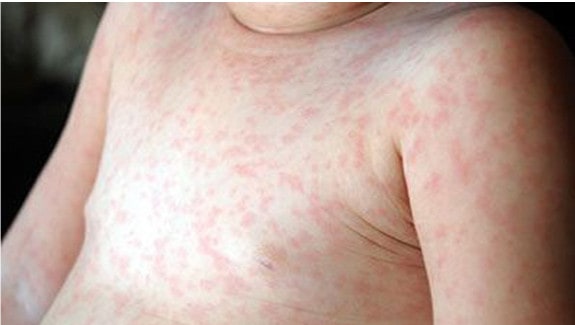Understanding Sixth Disease: A Parent’s Guide to Roseola Infantum
Welcome, dear parents! Have you ever heard of Sixth Disease, also known as Roseola Infantum? If your little one is suddenly experiencing a high fever followed by a distinctive rash, they might be encountering this common childhood ailment. But fret not! We’re here to ease your worries with a helpful guide, designed to provide you with valuable insights and practical tips to navigate through this episode.
What is Sixth Disease?
Sixth Disease is a viral infection that primarily affects infants and toddlers, typically between 6 months and 2 years of age. It’s caused by human herpesvirus 6 (HHV-6) and less commonly by human herpesvirus 7 (HHV-7). Though the name might sound alarming, it’s generally a mild condition that resolves on its own. However, it’s essential to be well-informed and ready to provide your child with the best care possible!
Symptoms of Sixth Disease
The onset of Sixth Disease is often marked by a sudden high fever, which can last between 3 to 7 days. Once the fever subsides, a telltale symptom emerges—a pinkish-red, flat or raised rash that starts on the trunk and spreads to the limbs and neck. It’s characterized by its smaller spots that might merge to form patches. Other symptoms may include:
- Irritability in infants
- Mild diarrhea
- Decreased appetite
- Swollen eyelids
- Mild cough or runny nose stemming from the initial viral infection
Understanding these signs can help you quickly identify Sixth Disease and manage it effectively from the comfort of your home.
Diagnosis and Treatment
Typically, a physical examination by your pediatrician is sufficient to diagnose Sixth Disease, thanks to its distinct pattern of symptoms. Nevertheless, blood tests may be recommended if the diagnosis is unclear. Treatment predominantly involves managing the high fever and ensuring your child remains comfortable. Options include:
- Febrile children often benefit from fever-reducing medications such as acetaminophen (Tylenol) or ibuprofen (Advil or Motrin).
- Encouraging fluid intake to prevent dehydration is crucial, especially when your child has a fever.
- Keeping your child comfortable with loose, lightweight clothing can also help manage fever and rash discomfort.
Prevention Tips for Parents
While Sixth Disease is contagious, it often spreads before the symptoms appear, making it tricky to prevent. However, standard hygienic practices such as regular hand washing and avoiding the sharing of utensils can limit the spread of the virus. As a parent, being aware and educated about this condition is your first line of defense!
Join us as we continue to delve into the complexities of Sixth Disease, including insights on recovery, when to seek medical advice, and how to provide the best possible support to your child during this time. Remember, knowledge is power, especially when it comes to maintaining your child’s health and well-being.
Remember to bookmark this page, as we embark on this enlightening journey towards understanding and handling Sixth Disease with confidence. Stay tuned for the next segment of our comprehensive guide, where we’ll explore more about recovery, complications, and FAQs to keep you well-informed and prepared!

Five Things Parents Should Know in Preparing for Sixth Disease
1. Recognize the Early Signs
Being observant about the early symptoms is critical to managing Sixth Disease. High fever without an apparent cause is often the first sign. Take note of how your child behaves during this fever period—any changes such as irritability, decreased appetite, or mild respiratory symptoms should be monitored. By acknowledging these symptoms, you can take quick and appropriate action.
2. Fever Management at Home
Understanding how to handle high fever is vital. Keep a reliable digital thermometer at home to monitor your child’s temperature accurately. As fever can spike, be equipped with children’s fever-reducing medications like acetaminophen or ibuprofen but remember to consult your pediatrician before using any medication. Creating a soothing environment, offering plenty of fluids, and ensuring your child gets ample rest is essential.
3. Rash Care Techniques
Once the rash appears, it’s usually a sign that the fever will dissipate. The rash itself may cause discomfort, so dress your child in soft, breathable fabrics to prevent irritation. Avoid using any strong soaps or lotions as they may exacerbate skin sensitivity. The good news is the rash does not typically itch or cause discomfort and doesn’t require any special treatments.
4. When to Seek Medical Attention
While Sixth Disease is typically mild, high fevers can sometimes lead to complications such as febrile seizures. If you notice any signs of lethargy, difficulty breathing, a persistent high fever, or if your child experiences a seizure, seek medical attention immediately. Likewise, if your child’s fever lasts more than seven days or the rash does not improve, a trip to the pediatrician is warranted.
5. Emotional Support and Comfort
Beyond the physical symptoms, the emotional well-being of your child is crucial during this period. Offer extra cuddles, read stories, play calm games, and ensure your child feels loved and comforted. Your reassurance as a parent can be a powerful tool in helping your child cope with illness and recovery. Remember that your calm demeanor can significantly influence your child’s ability to manage their discomfort and anxiety.
Armed with these helpful points of knowledge, you can prepare effectively for Sixth Disease and navigate your child’s illness with greater confidence. Keep in mind that this guide is intended to support your journey as a parent, and it is always wise to consult with your pediatrician for personalized advice and treatment.
Ensure to watch for updates in our comprehensive guide, where we will cover additional topics such as the healing process, answer common questions, and offer insights into unique scenarios associated with Roseola Infantum. Every child’s experience with Sixth Disease can differ, and staying informed will help you provide the best care for your little one.
See more great Things to Do with Kids in New Zealand here. For more information see here
Disclaimer
The articles available via our website provide general information only and we strongly urge readers to exercise caution and conduct their own thorough research and fact-checking. The information presented should not be taken as absolute truth, and, to the maximum extent permitted by law, we will not be held liable for any inaccuracies or errors in the content. It is essential for individuals to independently verify and validate the information before making any decisions or taking any actions based on the articles.




